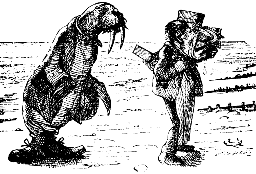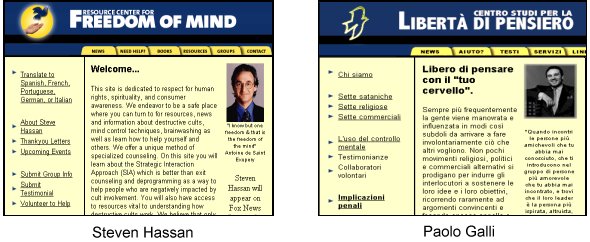 On June 29, 2000, Teresio Delfino, an Italian MP first elected on a right-wing ticket, who then moved to the left (in time to become an undersecretary), and who has since moved back to the right, presented what must certainly be one of the weirdest questions submitted in recent years (Interpellanza 2-02507, 29.06.2000, seduta n.751).
He demanded to know what measures the Government intended to take to suppress the "extremely serious and worrisome" activities of a "truly criminal conspiracy" set up in order to spread critical information about the multinational corporation Scientology. One of the "cleary illegal" activities the alleged conspirators were accused of consisted precisely in submitting "questions in Parliament."
The core of the alleged plot is a peaceful website, Allarme Scientology, deemed guilty of publishing information (which is always carefully checked and never denied) about the activities of the US multinational. The MP calls on the Government to take "legal action" against this site, actually mentioning law 25/6/93, # 205, which calls for six years in prison, withdrawal of the driving licence and even seizure of the offender's home (but in his question, Delfino gets his laws mixed up, citing instead "law # 122").
Extraordinary claims, they say, require extraordinary evidence. Teresio brings up only one piece of evidence:
Tellitall is a website which claims to present the anonymous accusations of a repentant conspirator. The alleged conspirators describes a plot between the Speaker of the Parliament, Luciano Violante, CICAP (an association which studies paranormal claims) and the secret services guided by an unlikely "agent AKA" (another closely related source, as we shall soon see, calls in the well-known TV scientific journalist Piero Angela and the criminal milieu).
Delfino shows no doubt about the reliability of this proof. In fact, he does not ask the Government to investigate to find out whether the alleged plot exists; rather, he demands to know "what funds have been assigned to this 'operation' and whether the Ministry has paid for the work done by the infiltrated spies who co-operate with the functionary 'AKA'."
There are some interesting differences between the question and its only source. Delfino was clearly a little embarrassed, and only mentions a certain "LV" as one of the conspirators, whereas the site clearly names Luciano Violante. The site also devotes a full page to CICAP, the "Italian Committee for the Control of Paranormal Claims" - a body whose membership list includes some of Italy's most famous scientists - an issue which Delfino skips over.
Of course this plot, and the website Tellitall, are just about as credible as the infamous Protocols of the Learned Elders of Zion (but with a very provincial touch, reminiscent of those long-forgotten films which told the adventures of Agent 777, the Italian version of James Bond).
It is, however, very serious for an MP to accept at face-value ridiculous accusations made against the Speaker of the Parliament, and from such a source.
It is a serious matter too when a member of parliament demands "legal action" against a website guilty only of providing potential consumers with documented information (newspaper articles, court sentences and official documents of various governments) about a company, in this case Scientology.
There are two possibilities. Either Teresio Delfino has seen the website whose suppression he is demanding, and hence he is in bad faith when he speaks of "clearly illegal" activities.
Or else he stood up in front of the Italian parliament, adjusted his tie, and accused a website of which he knew nothing at all of "religious discrimination" and "espionage", demanding that the full force of the state should strike the people running it.
But now let us take a look at the whole story, and its main actors.
Real Actors
Thus spoke Ron Hubbard, science-fiction author and creator of that extraordinary enterprise called Scientology.
My website usually deals only indirectly with Scientology. This time I shall speak a little more than usual about it, because the Tellitall story certainly inolves Hubbard's organization; but the main reason I am writing is that I find it intolerable - five centuries after Torquemada was laid to rest - for a politician to demand gaol sentences for people guilty of presenting documentation which may not be pleasing, but which is serious and reliable.
The Tellitall case has taken place in an atmosphere of growing intimidation against freedom of information on Internet; in recent years, there have been a great many actions, of various origin and involving various actors. The issue is quite entangled, and I am not claiming that different repressive initiatives are part of a single design, even though they have taken place at the same time.
To start with, here are the main actors in this story:
Don't ever tamely submit to an investigation of us. Make it rough, rough on attackers all the way."
(HCOPL February 25 1966, "Attacks on Scientology") Since there were no grounds whatsoever to sue the site on, the activists of Scientology had to invent a series of schemes at least to find out who Harry and Martini were.
One might wonder why discovering Harry and Martini's past should be so important. The founder of Scientology explains the reason in his usual sober and effective style:
2. That if one attacks Scientology he gets investigated for crimes.
3. If one does not attack Scientology, despite not being with it, one is safe.". Now, it is not easy to look for "crimes" in the past of two people whose identities are unknown; hence the need to find out who they are.
Allarme Scientology however has not only had problems with Scientology. Between autumn 1998 and spring 1999, it hosted my "Critical Page on CESNUR".
An article by John Marshall in the Toronto Globe and Mail, January 25, 1980 ( One of the people "having recourse to the criminal milieu" seems to be Luciano Violante, speaker of the Parliament. Violante is mentioned by name Imaginary Actors
We have met the real actors. Now we shall see, in chronological order, what they did and the imaginary personalities they created. Therefore the following is a list of both characters and events.
The first sign of an organized campaign to suppress freedom of discussion about "cult" issues dates back to early August, 1998, when Introvigne called on US authorities to "monitor" cult critics in general, even internationally, though no reference was yet made to Internet. On the A few months later - and independently of course - the first little Gremlins started to hatch: electronic monsters exploiting the various possibilities offered by Internet.
It immediately became clear that MIAS was a trap, and not only because of the childish style used by the author of the messages. The people that the young man claimed as contacts either did not know him, or did not even exist. The whole castle of cards however came down when a look at the files of some newspapers showed that the overactive young manga expert had signed no less than four letters to the editor - with his own name - on behalf of Scientology, published in the dailies La Stampa, Il Giorno and La Nazione.
Scientology's effects on people's intelligence must not be quite what they boast it is, if they had to recycle the same person for two such different operations; and especially if this person was not able to invent anything more brilliant tha the MIAS. The sorry but amusing details of the story can be read What seemed an eccentric action by a disturbed person later turned out to be something quite different: in a message dated April 9, 1999, on alt.support.ex-cult, Religiosus openly proclaimed that:
As soon as he had been unmasked, Mr Galli The cloned site to the left, the cloning site to the right
Translated, this means that playing with Sarin gas in the Tokyo subway and publishing documents on the totalist aspects of certain cults are two equally dangerous crimes.
Odd, because in the small world of Italian cult critics, nobody knew the lady running the site; an idea of her mental level can be gained from the fact that she signed herself as "r0b3rta" or "Robi BiruBiru."
The site was utterly insignificant. Some material picked up from Allarme Scientology without permission, a collection of "personal testimonies" which fit into the category of what a Scientologist thinks a critic thinks.
Now we can clearly see that the site was set up only so that a brain the size of Mr Delfino's would think that there was a plot going on among several anti-Scientology sites; a single website can hardly be called a "conspiracy".
In any case, Scientology controllo mentale - which according to Delfino "co-operated" with Allarme Scientology - had been publicly denounced by Martini of Allarme Scientology months before Delfino's question to parliament, in a note by Martini in Alessia Guidi's The site disappeared in summer 2000.
According to Delfino, the site "has the purpose of giving voice to complaints by citizens concerning various issues in the field of human rights around the world".
And indeed the index.html page of the site ambituously offers us news from around the planet, subdivided into sections - "Continental Africa [sic]", China, Hong Kong, Japan, Australia, New Zealand, Bosnia, Italy, United Kingdom, Egypt, Israel, Saudi Arabia, Canada, United States, Russia, Ukraine, Georgia, Brazil, Ecuador and Mexico…
Now, let us take a look inside. One click suddenly turns off a China, Hong Kong, Japan, Australia, New Zealand, Egypt, Israel, Saudi Arabia, Canada, Russia, Ukraine, Georgia, Brazil and Mexico - in fact, they all take you to the This is March 2001, in ten months they have found nothing else to write about any of these countries.
Let us now look at the few surviving countries.
"Continental Africa" [sic] has two links, boty of which lead to the same site, claiming that AIDS was deliberately created to exterminate blacks and homosexuals.
Bosnia on the other hand takes us to an interview with a Serbian nationalist who complains about the one-sidedness of US policy. The link is again an outside one.
United Kingdom takes us to another outside link, claiming that Princess Diana was killed by the secret service and also selling some breast-enlarging products.
United States presents us with no less than four links, all however external: varies conspiracy theories about who killed Lincoln (one accuses the Jewish bankers, the other the Vatican); a small page describes a slave revolt in the 19th Century, and the last one did not open when we tried it, but seems to speak of the trouble an immigrant went through in the US.
Ecuador, finally, takes us to a website whose very name is indicative of conspiracy thinking: "conspir".
All that is left now is Italy. And here is where all the real content of the site is. In other words, this site which presents itself as international and registered in the US, actually contains only a few pages, all in Italian and which speak in a very confused fashion about a purely Italian issue.
Now let us take a look at the site ID data:
DOMAIN NAME: TELLITALL.ORG TECHNICAL CONTACT: RECORD LAST UPDATED ON 30-AUG-2000.
This means that the owner of the site is a certain Mario Mazzerino, with a very Italian e-mail address, mazzerino@napoli.2ndmail.com, who however claims to live in Fishers, Tennessee, USA. Oddly enough, a search for "Mario Mazzerino" on the Altavista White Pages The technical contact for Tellitall is Impact Computer Company, which does exist.
In other words:
- Tellitall belongs to a person who does not exist
- the authors introduced a few random, external conspiracy links
- the authors however had so little imagination that in ten months they were unable to come up even with an external link for fourteen out of twenty pages
- But something far better is still to come. Remember the date the site was registered? May 5th, 2000. Now go to www.tellitall.org/LeProve/scenes.html,. You will see that the supposed discoverer of the Plot claims he sent his dossier to Tellitall on... May 4th, 2000.
- To all intents and purposes, Tellitall is simply a badly made frame around the Italian pages, which were not even translated into English.
This much should be clear to anybody, even to those who know nothing about the controversies surrounding Scientology.
Teresio Delfino, in his question, says that the "activities revealed" on the website are "extremely detailed and with accurately described circumstances". Somebody commented that even an idiot could see that the site was a trap; however Mr Delfino of course is not an idiot.
- Massimo Introvigne If we remember that "crime" and "criticism", for Scientology, are more or less synonyms, it is not hard to imagine what "crime reduction" could mean. Defending Freedom of Information
For about two years, then, there has been a campaing to suppress those sites which offer critical documentation about multinational "cults" or organizations which endorse them. The critical sites are not "anti-cult" in the sense that they do not rail against or condemn anyone, but simply spread information.
These sites - such as Kelebek and Allarme Scientology - provide a very important social function: they offer potential consumers documented information about organizations which are constantly trying to recruit new customers. People can listen to both sides before making their informed choice. Obviously, similar sites can be more bothersome than "anti-cult" sites since they provide unwelcome facts and not contrary opinions; however it is not the fault of the critical sites if such facts exist.
Are critical sites reliable? It is enough to remember that Allarme Scientology and Kelebek have unique adversaries: for the former, it is the most litigation-happy organization on the planet, for the latter, it is a partner of one of the most important law firms in Italy. Yet neither of these sites have ever been sued for having made one false statement or for having offended anybody.
These sites are not opposed by other sites, which dialogue or which criticize the critics. There are threats, traps, accusations of "terrorism" and fantastic conspiracy theories based on false evidence.
We have told the facts in chronological order. This does not mean that all the events mentioned are necessarily related to each other. A sophisticated writer like Introvigne is hardly likely to be the author of something like Tellitall, and the fact that Introvigne and Delfino both come from the same political milieu and the same part of Italy may well be merely coincidental.
No doubt Introvigne was telling the truth when he denied any connection to the "Italian Anti-Cult Movement", although it is a bit surprising to see him not so long after speaking next to a Scientologist on how to prevent "crime".
Of course, it is natural for extremist organizations to do whatever they can to silence their critics.
What is however deplorable is that people who go around with an air of authority should lend their support to threats and false conspiracy theories. This is what Massimo Introvigne does when he publicly claims that publication of critical documents on "cults" is "terrorism" and calls on the law enforcement authorities to "monitor" people who commit such dangerous deeds.
It is equally serious that a Member of Parliament of the Italian Republic should lend his authority to a document which accuses the Speaker of the Parliament of being the leader of an "anti-religious network" and should demand years in gaol for people who had the courage to present publicly availabe documents about a US company. Basing himself on a website which looks like a Japanese manga.
Miguel Martínez
March 2001
|

